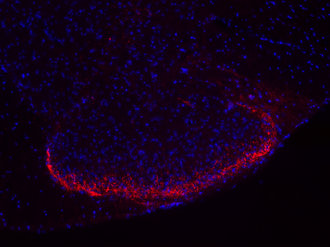
| Cat. No. 459 005 |
50 µg specific antibody, lyophilized. Affinity purified with the immunogen. Albumin and azide were added for stabilization. For reconstitution add 50 µl H2O to get a 1mg/ml solution in PBS. Then aliquot and store at -20°C to -80°C until use. Antibodies should be stored at +4°C when still lyophilized. Do not freeze! |
| Applications | |
| Immunogen | Synthetic peptide corresponding to AA 58 to 68 from mouse Protachykinin-1 (UniProt Id: P41539) |
| Reactivity |
Reacts with: mouse (P41539), rat (P06767). Other species not tested yet. |
| Specificity | The antibody is specific for substance P. It shows no cross-reactivity to neurokinin A, neurokinin B, or the unprocessed precursor protein. |
| Data sheet | 459_005.pdf |

Substance P (also designated SP or NK-1) is a highly conserved peptide that was originally discovered in 1931 (1). It is an undecapeptide belonging to the tachykinin neuropeptide family. Mammalian tachykinins include substance P, neurokinin A and neurokinin B, and they all share the same carboxy-terminal amino acid sequence (2,3).
Substance P is generated by post-translational cleavage of the precursor Protachykinin-1 (2,3).
Substance P is widely distributed throughout the central and peripheral nervous system, including the brain, spinal cord, and nerve fibers and endocrine cells of the gastrointestinal tract (3,4).
Substance P exerts its effects by binding to the neurokinin-1 receptor NK-1R (2,3).
It functions in the central and peripheral nervous systems as a neurotransmitter or neuromodulator (5) and is involved in many biological processes, including intestinal smooth muscle contraction, blood pressure regulation, neurogenic inflammation, nociception and pain transmission (2,5). Furthermore, it has gained attention for its role in complex psychiatric processes including stress, anxiety, and depression (2).